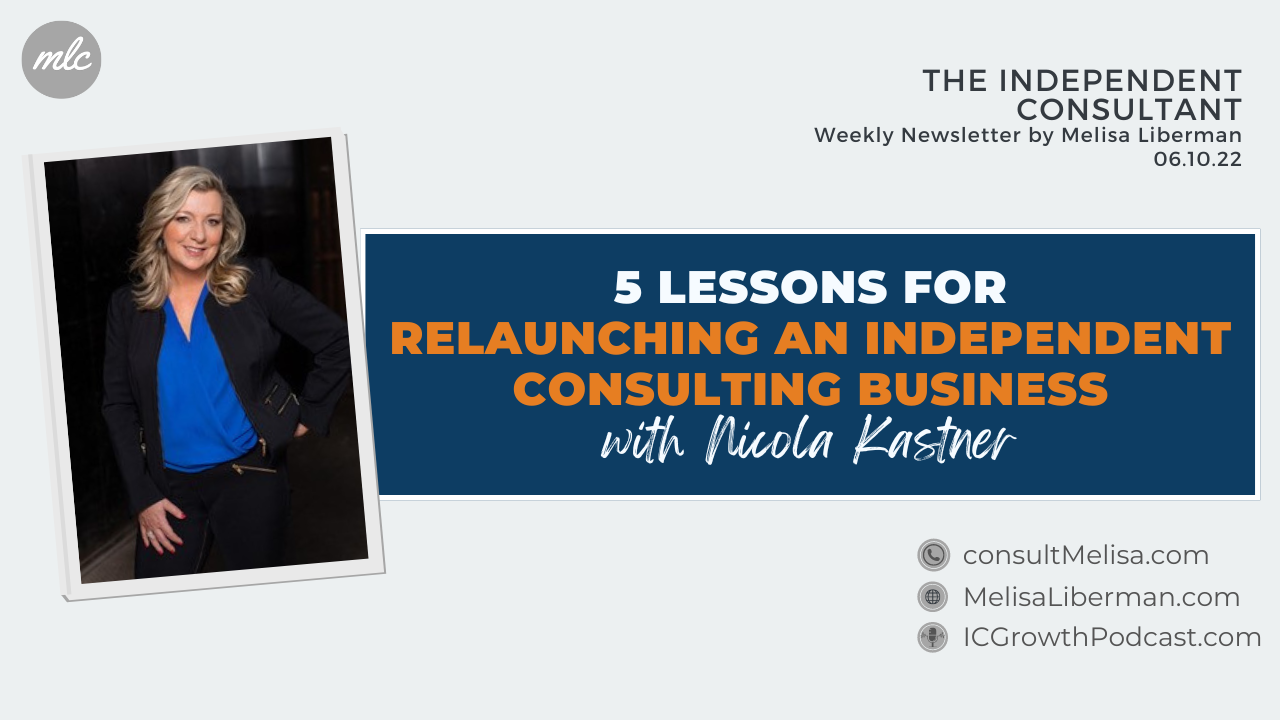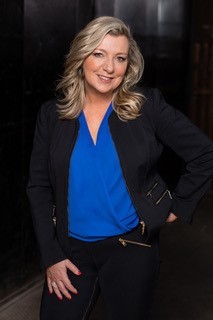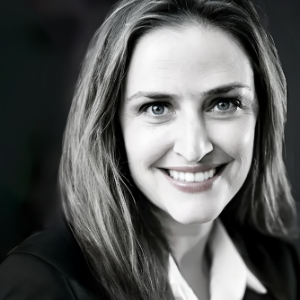5 Lessons for Re-Launching an Independent Consulting Business with Nicola Kastner
Jun 10, 2022
Estimated Reading Time: 19 minutes
Download the article as a PDF:

Introduction
I recently interviewed one of my independent consulting business owner clients, Nicola Kastner, for the (Grow Your Independent Consulting Business) podcast.
Nicola has owned an independent consulting business twice in her career.
She first started working as an IC 10 years ago.
She hit some setbacks (that she shares in the interview below) and decided to return to corporate where she worked at SAP for 5 ½ years.
In the last year, she left her corporate role to re-start her independent consulting business.
She learned so many lessons in that first iteration of her independent consulting business, including the 5 main lessons I share with you in today’s article.
She shared the lessons she learned from that first round of independent consulting and what she's doing differently this time around to ensure her company is sustainable and that she feels fulfilled as a business owner and in the client work she's doing.

Summary of Nicola's Lessons Learned

- I inadvertently created a staff augmentation business model, which caused me to underearn.
- I solely focused on client delivery and didn’t invest time in my business each week.
- I thought of sales more as an interview of me, which made it awkward and confusing.
- I wasn’t clear on my offer or my guardrails, so I accepted the work that came to me and didn’t protect my capacity.
- I created everything from scratch and didn’t templatize or productize the client delivery work to create business assets.
Now, let’s dive into each of these lessons in detail.
Lesson #1: "I inadvertently created a staff augmentation business model, which caused me to underearn.”

I operated as staff augmentation the first time I worked as an independent consultant. I would take on long-term contracts, 15 months dedicated to one company, and two years as an implant in an organization. They were based on hourly-based pricing versus value-based projects and offerings, which I could offer.
As one of the benefits of the great resignations, so to speak, or why what I prefer to call the great realization, as companies are embracing freelance talent, they can get top tier talent for a fraction of the cost really, that they would pay, if it was a full-time employee where they'd have to pay the salaries and the benefits and so forth.
And so as I re-started my independent consulting business this year, I really thought about the value that I am going to bring to my clients, and then how would I charge for that? And that's not hourly. It makes so much more sense to charge based on output and value.
Lesson #2: "I focused on client delivery and didn’t invest time in my business each week."

After coming off a 15-month assignment for client where I essentially worked as a full-time employee, I realized I was supposed to have been my own accountant and IT and sales personnel. But I hadn't done any of those things.
So, two things happened, the nest egg that I had built up as a consultant had gone away. And because I hadn't done my taxes on time, my accountant couldn’t do his magic. So any opportunity that he had was gone.
The taxes took away the nest egg, and I had no pipeline.
From this experience, I learned that I must carve out my week (not literally, because I'm not one of these disciplined people who have their day structured), but I make a conscious effort to invest time each week in my business.
Now, I break my week up into these three areas:
- Client work
- Building the infrastructure of the business to create repeatable systems
- The sales process
Lesson #3: “I thought of sales more as an interview of me, which made it awkward and confusing.”

I didn’t make time for business development or sales the first time I was an independent consultant. And, as a result, I had no pipeline when my engagement ended. At that point, I decided I would look to rebuild my business or look for a full-time job and whichever came first. And, I quickly landed a full-time job at SAP.
So, I left my independent consulting business and was at SAP for five and a half years.
Now, in this second round of owning an independent consulting business, I’ve been diving into the sales process to make sure it’s repeatable and creating results.
I found sales really awkward. I really struggled with discussing my value and what I charge. It has been my biggest block.
I had an epiphany. I realized I was treating the conversation as a job interview, that they were interviewing me. And you taught me to flip that around. I'm now interviewing them to see if they get one of my spots.
And it shaped that mental shift. And it's just been it's a game-changer. It really has.
I now have a structured approach going into the sales calls as well. Before I'd take all my notes, and then when I sat down to write a proposal, I’d question myself, how do I do this? It would become so overwhelming to me. I hated writing these proposals, even though I wanted the business.
And so by changing the dynamic of the sales conversation and also being structured about it, I’m now very clear about how to manage the sales conversation. I think about:
- What are the questions that I need to ask to demonstrate my value and
- what are the questions I need to know in order to build the right solution and recommendation for potential clients?
This has changed the game and the conversation.
Lesson #4: " I accepted the work that came to me and didn’t protect my capacity.”

I realized after my first round as an independent consultant, where I was more of a staff augmentation type resource, that I don't have to take every opportunity that comes to me. I realized I can be selective so that I’m working with profitable clients doing work I really want to do, and that the work doesn’t need to fully consume my capacity for long periods of time.
When you work in corporate, you have to do your job whether you like the person that you're going to be working with or not. You have to do it.
You don't have to do that as an independent consultant. And so, if I want to provide my best work, I need to work for somebody that's going to value me and my expertise and my services.
Now I'm okay with walking away from a potential client if the fit and the chemistry aren’t there.
Lesson #5: “I created everything from scratch and didn’t templatize or productize the client delivery work to create business assets.”

When I was working in a corporate role, I had one client which was my employer. I did whatever needed to happen.
Now as a consultant, I am building marketing strategies, where events are a component of it, those fundamentals, no matter the industry, the size of the company, the geography, whatever, they're the same.
I’ve learned to identify those foundational elements, the 80%, that can become productized, and then tweak the 20% that’s specific to a specific client and the nuances to that client.
For example, the first time I'm building from scratch, let's say it was 100 hour project. It takes me 80 hours to do the work the first time. It doesn't take me 80 hours to do it the second time, maybe it takes me 40 and then 20 hours. Eventually, I want it that 80% down to 10 hours so that it allows me to expand my scope and my scale.
I can take on more projects because the foundational process layers are there and I'm not recreating the wheel every single time. I'm still meeting my client’s specific needs because that's one thing as consultants we have to do is we have to add value can't just dial in the same deliverable every single time.
So now I’m much more focused and cognizant of how I create that foundational element but then also provide the right client customization on top of it. That's the fun piece.
In Conclusion
Nicola shared so many strategies and lessons learned from her two experiences running her independent consulting business.
Be sure to catch her full episode on the Grow Your Independent Consulting Business) podcast, episode #065.
For more support
Take the Independent Consulting Business Predictability Assessment I’ve created for you.
It will help you pinpoint the areas to improve so you increase the predictability and sustainability of your business, so you don’t leave money on the table or make owning a business harder than it needs to be.
Click here to take the Assessment.
For more about Nicola –
Nicola Kastner is the Founder of The Event Strategist, a boutique consultancy firm who offers event strategy advisory services to global brands to help them successfully optimize their event experiences to drive bottom-line results
Prior to launching her consulting practice, Nicola held various roles on both the brand and agency sides of the business, including most recently as the Global Vice President of Event Marketing Strategy for SAP, where she was responsible for designing and optimizing event strategies for events ranging from 25 to 25,000 people.
Nicola has designed event portfolios that capture new audiences, drive accelerated business performance, and add customer value across the world, as well as led teams through strategic reinventions of event portfolios as they shifted their approach from only in-person events to integrated portfolios that include the appropriate mix of physical, digital, and hybrid events.
She has won numerous awards for her work including induction into the Canadian Meeting Hall of Fame, named as a "Top Woman in Events" by Event Marketer Magazine, named to the Event Marketer “B2B Dream Team” and named to the “2022 Top Event Marketers” list by Eventible.
She resides in Toronto, Ontario Canada with her husband and two teenage children.
Social Links:
Twitter: @nicola_kastner
LinkedIn: https://www.linkedin.com/in/nicolakastner/
Website: https://nicolakastner.com




